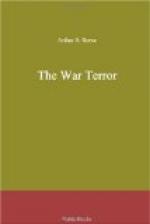“At any rate,” he said, as he throttled down his engine with a flourish before the pretty little Glenclair station, “that girl needn’t worry.”
There was evidently no use in trying to extract anything further from him. He had said all that medical ethics or detective skill could get from him. We thanked him and turned to the ticket window to see how long we should have to wait.
“Either that doctor doesn’t know what he is talking about or he is concealing something,” remarked Craig, as we paced up and down the platform. “I am inclined to read the enigma in the latter way.”
Nothing more passed between us during the journey back, and we hurried directly to the laboratory, late as it was. Kennedy had evidently been revolving something over and over in his mind, for the moment he had switched on the light, he unlocked one of his air-and dust-proof cabinets and took from it an instrument which he placed on a table before him.
It was a peculiar-looking instrument, like a round glass electric battery with a cylinder atop, smaller and sticking up like a safety valve. On that were an arm, a dial, and a lens fixed in such a way as to read the dial. I could not see what else the rather complicated little apparatus consisted of, but inside, when Kennedy brought near it the pole of a static electric machine two delicate thin leaves of gold seemed to fly wide apart when it was charged.
Kennedy had brought the glass tray near the thing. Instantly the leaves collapsed and he made a reading through the lens.
“What is it?” I asked.
“A radioscope,” he replied, still observing the scale. “Really a very sensitive gold leaf electroscope, devised by one of the students of Madame Curie. This method of detection is far more sensitive even than the spectroscope.”
“What does it mean when the leaves collapse?” I asked.
“Radium has been near that tray,” he answered. “It is radioactive. I suspected it first when I saw that violet color. That is what radium does to that kind of glass. You see, if radium exists in a gram of inactive matter only to the extent of one in ten-thousand million parts its presence can be readily detected by this radioscope, and everything that has been rendered radioactive is the same. Ordinarily the air between the gold leaves is insulating. Bringing something radioactive near them renders the air a good conductor and the leaves fall under the radiation.”
“Wonderful!” I exclaimed, marveling at the delicacy of it.
“Take radium water,” he went on, “sufficiently impregnated with radium emanations to be luminous in the dark, like that water of Denison’s. It would do the same. In fact all mineral waters and the so-called curarive muds like fango are slightly radioactive. There seems to be a little radium everywhere on earth that experiments have been made, even in the interiors of buildings. It is ubiquitous. We are surrounded and permeated by radiations—that soil out there on the campus, the air of this room, all. But,” he added contemplatively, “there is something different about that tray. A lot of radium has been near that, and recently.”




